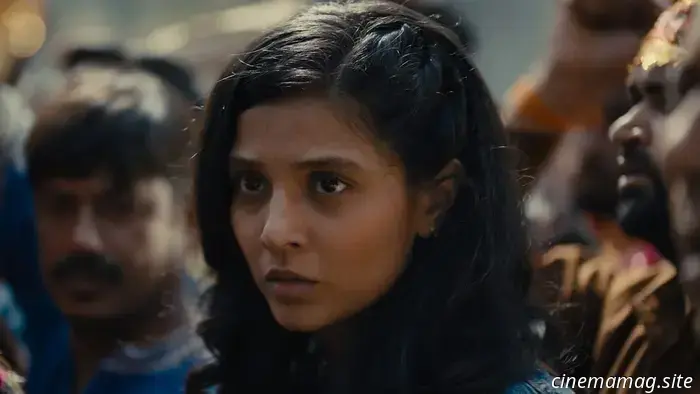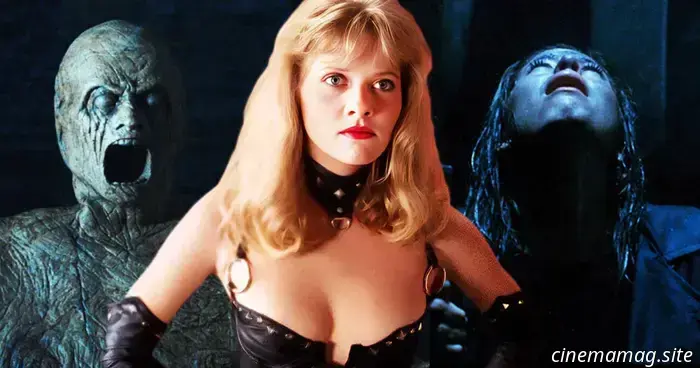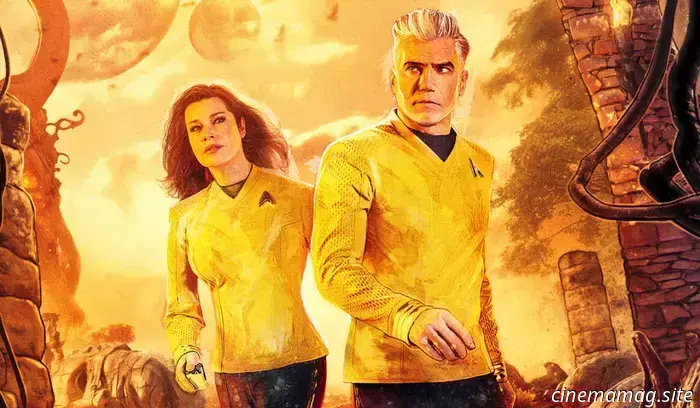
Pinch Director Uttera Singh Discovers Healing Through Trauma with Her Tribeca Debut
It all began with a pinch. Growing up, Uttera Singh frequently heard the legendary tale of her mischievous cousin, who would pinch people in crowds to provoke mob fights for some breathing room. This memory lingered with Singh, and in 2019, while crafting a film about an assault and its effects on a young woman and her community, she realized she could incorporate this story.
Not only did it become the title of her debut feature as a director, but Singh also stars in and produces the dramedy that was chosen from over 14,000 global submissions for the Tribeca Film Festival.
Pinch tells the story of Maitri (played by Singh), an aspiring travel blogger who embarks on a journey with her mother and neighbors to the annual Hindu festival Navratri. During the trip, she is groped by a respected community figure. Later, she seeks vengeance by pinching a woman in the crowd and blaming the assaulter. The film unfolds as a darkly comedic narrative about the female experience, mother-daughter relationships, grief, and trauma.
“My job is finished,” Singh shares with MovieMaker. “I aimed to narrate the story I wished to tell, and people will interpret it in their own ways. For some, it offers healing; for others, it sparks anger. Personally, I view life as absurd and like to uncover the absurdity within it. It’s possible to experience both pain and joy simultaneously, and I use uncomfortable humor as my way of coping with trauma.”
Originally envisioned as a short film, Pinch evolved into a feature with the collaboration of cinematographer and co-writer Adam Linzey. The film had its world premiere at Tribeca on Friday and will be screened again on Saturday and Monday. Singh is excited about the prospects of premieres in Europe and India, along with distribution opportunities.
We spoke with Singh about the significance of community in the filmmaking process, the power dynamics surrounding assault, and the challenge of balancing comedy with trauma.
Uttera Singh on Balancing Comedy and Pain in Pinch
Pinch writer, director, and star Uttera Singh.
Amber Dowling: You wrote the script in English and then translated it into Hindi. Were there challenges with some of the nuances?
Uttera Singh: Yes, some nuances don’t always carry over, which I realized when I shared the first version with an actor I really wanted for the role of my mother’s friend. Initially, she declined because she felt the script was poor, specifically that the Hindi didn’t flow well. I was really hurt at first, but upon rereading it, I understood she was correct. It needed two more revisions for the right flow and coherence. I had lost hope when she initially rejected it, but once I revised it, I resent it to her, and she agreed to participate.
Amber Dowling: The film seems to normalize the healing process after abuse and the shared trauma many women experience. Was that intentional?
Uttera Singh: Yes, and I also aimed to address how men are sometimes left out of the conversation. Men also experience abuse. Women come together to discuss and heal, but men may not always have that opportunity. This isn’t intended to diminish women’s experiences; both can coexist. I read a compelling book called Invisible Women by Caroline Criado Perez, where she discusses how assault isn’t merely a gender issue but a power issue. That resonates strongly.
Amber Dowling: How did you approach the comedy aspect given the serious subject matter?
Uttera Singh: I had to restrain myself from making light of the assault scenes because I wanted to handle them with sensitivity and realism. However, I view life as inherently absurd. I’ve often been reprimanded for laughing at inappropriate times. I embrace that side of myself now and accept that it’s perfectly fine.
Also Read: 50 Film Festivals Worth the Entry Fee in 2025
Amber Dowling: The film has a budget of under a million. How did you secure the financing to make it happen?
Uttera Singh: The best part was that I returned to my hometown in India to film it. My entire community came together, and while some funds were privately raised, it also involved a lot of resourcefulness, including some asking and borrowing.
One of my favorite anecdotes is related to our need for a red refrigerator for an apartment scene. My cousin contacted a neighbor, and they swapped fridges so we could use hers temporarily. Many people lent us their living room furniture. It was incredibly heartwarming. Thinking about how the community came together moves me emotionally. This film was made with immense love from the community.
Main image: Pinch, courtesy of Pinch.
Amber Dowling: Did that sense of community play a role in the large crowd scene where the title pinch occurs?
Uttera Singh: Absolutely. That part was very challenging, and we only had the jib for two hours—that's all we could afford. People traveled


Other articles
 A clip from Jurassic World Rebirth features Scarlett Johansson's team facing off against a Mosasaurus.
With less than a month until its release, Universal Pictures has unveiled a new clip from Gareth Edwards’ action-adventure film Jurassic World Rebirth. The scene features a team led by Scarlett Johansson desperately collaborating to dart a menacing Mosasaurus that is endangering their boat. Take a look below… Five years […]
A clip from Jurassic World Rebirth features Scarlett Johansson's team facing off against a Mosasaurus.
With less than a month until its release, Universal Pictures has unveiled a new clip from Gareth Edwards’ action-adventure film Jurassic World Rebirth. The scene features a team led by Scarlett Johansson desperately collaborating to dart a menacing Mosasaurus that is endangering their boat. Take a look below… Five years […]
 10 Horror Films That Escape the Second Movie Pitfall
Casey Chong examines ten directors who have delivered outstanding sophomore horror films. Every filmmaker aspires to make a significant impact right from the start, and many succeed with their first feature, garnering favorable reactions from critics and viewers alike. The subsequent hurdle is maintaining that momentum without succumbing to the […]
10 Horror Films That Escape the Second Movie Pitfall
Casey Chong examines ten directors who have delivered outstanding sophomore horror films. Every filmmaker aspires to make a significant impact right from the start, and many succeed with their first feature, garnering favorable reactions from critics and viewers alike. The subsequent hurdle is maintaining that momentum without succumbing to the […]
-figure-unleashed-by-Hasbro.jpg) Hasbro has released the Marvel Legends Series Wolverine (Weapon X) figure.
Hasbro has officially confirmed that pre-orders are now available for the Marvel Legends Series Wolverine (Weapon X) action figure, which draws inspiration from the character's iconic comic book look and comes with a vintage retro-style cardback. You can view the promotional images and additional details here... SEE ALSO: Psylocke vs. Thanos Marvel Legends Series Gamerverse 2-pack announced by [...]
Hasbro has released the Marvel Legends Series Wolverine (Weapon X) figure.
Hasbro has officially confirmed that pre-orders are now available for the Marvel Legends Series Wolverine (Weapon X) action figure, which draws inspiration from the character's iconic comic book look and comes with a vintage retro-style cardback. You can view the promotional images and additional details here... SEE ALSO: Psylocke vs. Thanos Marvel Legends Series Gamerverse 2-pack announced by [...]
 The oceanic survival thriller Row has released a trailer ahead of its premiere at Raindance.
Kaleidoscope Entertainment has released a trailer and poster for Row, the forthcoming ocean survival thriller directed by Matt Losasso, which is scheduled to debut at the 33rd Raindance Film Festival this month. The film stars Bella Dayne, Nick Skaugen, Sophie Skelton, Akshey Khanna, David O’Hara, and Mark Strepan; take a look at […]
The oceanic survival thriller Row has released a trailer ahead of its premiere at Raindance.
Kaleidoscope Entertainment has released a trailer and poster for Row, the forthcoming ocean survival thriller directed by Matt Losasso, which is scheduled to debut at the 33rd Raindance Film Festival this month. The film stars Bella Dayne, Nick Skaugen, Sophie Skelton, Akshey Khanna, David O’Hara, and Mark Strepan; take a look at […]
 The G.I. Joe Classified Series features Slice & Dice, Budo, and Hawk with M.M.S., marking the start of Yo Joe June.
Hasbro has begun Yo Joe June 2025 by officially opening pre-orders for three new releases in the G.I. Joe Classified Series action figure line: the Cobra Ninjas Slice & Dice 2-pack, a deluxe version of Kyle ‘Budo’ Jesso, and Clayton ‘Hawk’ Abernathy accompanied by the M.M.S. (Mobile Missile System). Take a look at the promotional images for the new […]
The G.I. Joe Classified Series features Slice & Dice, Budo, and Hawk with M.M.S., marking the start of Yo Joe June.
Hasbro has begun Yo Joe June 2025 by officially opening pre-orders for three new releases in the G.I. Joe Classified Series action figure line: the Cobra Ninjas Slice & Dice 2-pack, a deluxe version of Kyle ‘Budo’ Jesso, and Clayton ‘Hawk’ Abernathy accompanied by the M.M.S. (Mobile Missile System). Take a look at the promotional images for the new […]
 Star Trek: Strange New Worlds has released a new trailer for season 3 along with character posters.
As Star Trek: Strange New Worlds is scheduled to return next month, a fresh trailer has been released for the third season of the sci-fi series, accompanied by a collection of new character posters featuring Captain Pike (Anson Mount) with Una (Rebecca Romijn), Chapel (Jess Bush) alongside Spock (Ethan Peck), and Uhura (Celia Rose Gooding) together with Ortegas […]
Star Trek: Strange New Worlds has released a new trailer for season 3 along with character posters.
As Star Trek: Strange New Worlds is scheduled to return next month, a fresh trailer has been released for the third season of the sci-fi series, accompanied by a collection of new character posters featuring Captain Pike (Anson Mount) with Una (Rebecca Romijn), Chapel (Jess Bush) alongside Spock (Ethan Peck), and Uhura (Celia Rose Gooding) together with Ortegas […]
Pinch Director Uttera Singh Discovers Healing Through Trauma with Her Tribeca Debut
It all began with a pinch. As she was growing up, Uttera Singh frequently heard the legendary tale of her mischievous cousin, who would pinch people in crowded places and provoke a mob.
